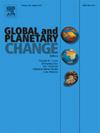Resistant degradation of petrogenic organic carbon in the weathering of calcareous rocks
IF 4
1区 地球科学
Q1 GEOGRAPHY, PHYSICAL
引用次数: 0
Abstract
Weathering of rock-derived organic carbon (OC) is an important source of atmospheric CO2 in the global carbon cycle, contributing to the long-term regulation of climates. Despite numerous investigations on clastic rocks, weathering behaviors of OC in calcareous rocks remain poorly constrained due to their conventional recognition of organic-lean features. Here, we analyzed bulk OC and biomarkers along weathering profiles of organic-rich calcareous rocks from the Green River Formation. Total OC and ramped-temperature pyrolysis/oxidation results reveal a minimal degradation of OC. Given a substantial fraction of bulk OC and a rich pool of biomolecules preserved in carbonate matrix, our results suggest that the limited bulk-level degradation is attributed to the shielding of OC in carbonate matrix. Furthermore, contrasting biomarker proxies are observed between free and associated forms, implying that carbonate-associated lipids are resistant to degradation during weathering; whereas clearly decreasing patterns of free lipids at the molecular level correspond to weathering-induced microbial degradation of excluded OC. Overall, our findings reveal that calcareous rocks might be an overlooked, yet understudied, carbon pool involved in the global organic carbon cycle.
求助全文
约1分钟内获得全文
求助全文
来源期刊

Global and Planetary Change
地学天文-地球科学综合
CiteScore
7.40
自引率
10.30%
发文量
226
审稿时长
63 days
期刊介绍:
The objective of the journal Global and Planetary Change is to provide a multi-disciplinary overview of the processes taking place in the Earth System and involved in planetary change over time. The journal focuses on records of the past and current state of the earth system, and future scenarios , and their link to global environmental change. Regional or process-oriented studies are welcome if they discuss global implications. Topics include, but are not limited to, changes in the dynamics and composition of the atmosphere, oceans and cryosphere, as well as climate change, sea level variation, observations/modelling of Earth processes from deep to (near-)surface and their coupling, global ecology, biogeography and the resilience/thresholds in ecosystems.
Key criteria for the consideration of manuscripts are (a) the relevance for the global scientific community and/or (b) the wider implications for global scale problems, preferably combined with (c) having a significance beyond a single discipline. A clear focus on key processes associated with planetary scale change is strongly encouraged.
Manuscripts can be submitted as either research contributions or as a review article. Every effort should be made towards the presentation of research outcomes in an understandable way for a broad readership.
 求助内容:
求助内容: 应助结果提醒方式:
应助结果提醒方式:


